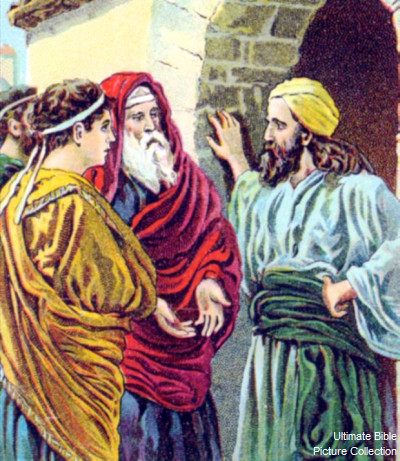
THE GREEKS
SEEK AN INTERVIEW WITH JESUS.
AMONG the people that came up to the Passover, there were certain Greeks who were very anxious to see Jesus. Coming to Philip of Bethsaida, they told him what they wanted. Philip first talked with Andrew, and then they two went and told Jesus. Jesus took this opportunity to speak of his coming death and resurrection. He said, "The hour is come that the son of man should be glorified. Verily, verily, I say unto you, Except a corn of wheat fall into the ground and die, it abideth alone; but if it die, it bringeth forth much fruit." By this he meant to teach that, although he was soon to be put to death and laid away in the tomb, he would rise to a more glorious life, and be the means of saving multitudes of people; just as a kernel of wheat, when it is planted, sends up a stalk that bears many kernels. And as the kernel would bring forth no fruit, except it were planted, so mankind could not be saved from their sins, unless Jesus should die for them. Jesus meant to show them how necessary it was for Him to die, and to encourage them with the thought that death could neither hold them nor him in its grasp. He also wanted to teach them to set a higher value upon the life to come, than upon this life; so he said, "He that loveth his life shall lose it, and he that hateth his life in this world shall keep it unto life eternal."
This was as much as to say that he who cares more for the things of this life than he does for God and heaven, will never have any life but this, and will lose all part in the life to come; and that any one who thinks less of the things of this world than of the world to come, will have not only this life, but the joys of a future life to all eternity.
Then said Jesus, " If any man serve me, let him follow me; and where I am, there shall also my servant be; if any man serve me, him will my Father honor." We follow Jesus when we do as he did, and live as he taught. And if we do thus follow him, we have the promise that God will honor us with eternal life, and a home with our Saviour.
After this, Jesus was troubled in spirit. He knew that the time was close at hand when the sins of the whole world would be laid upon him. He could foresee the awful agony that he was soon to pass through, and for a moment seemed to shrink from it. He said, "Father, save me from this hour: but for this cause came I unto this hour. Father, glorify thy name."
At this moment a voice from heaven was heard, saying, "I have both glorified it, and will glorify it again." Some of the people that stood by, said that it thundered, while others said, "An angel spake to him." But Jesus said, "This voice came not because of me, but for your sakes."
In talking farther with the people, Jesus told them that he was to be with them but a little while; that they must walk in the light while they had it; for if they did not, the light would be withdrawn, and darkness would come upon them. We, too, have the light of the Saviour's words; and if we obey those words, we may be said to walk in the light; if we walk in the light, we are children of the light, and shall finally go to dwell in a world of light and glory. Notwithstanding the many miracles that Jesus had done, there were not many who believed on him as the Messiah. Even the voice from heaven could not convince them. There were, however, even among the chief rulers, some who believed on him; but they loved the praise of men more than the praise of God; and would not own that they believed in Jesus, for fear that they might be put out of the synagogue.